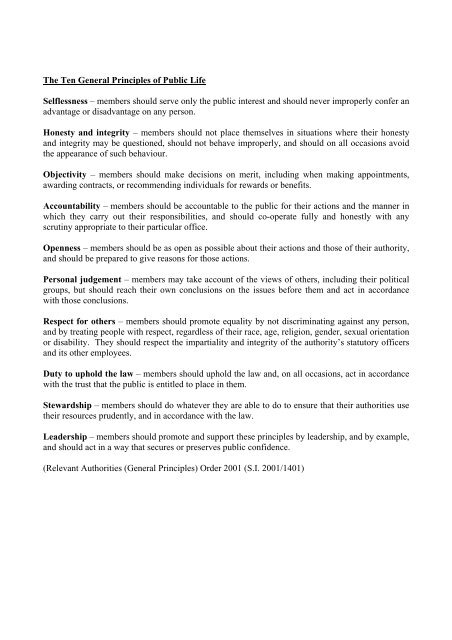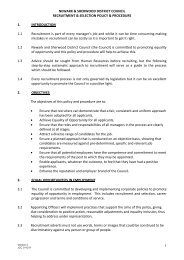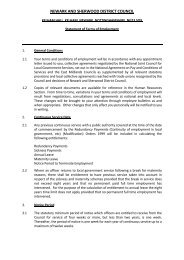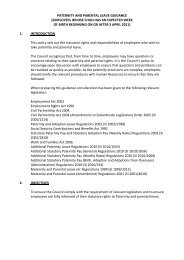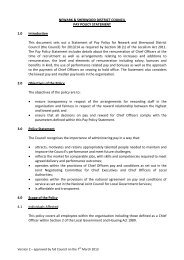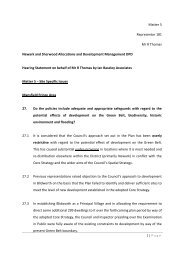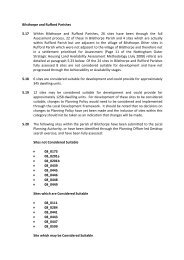Councillors Code of Conduct - Newark and Sherwood District Council
Councillors Code of Conduct - Newark and Sherwood District Council
Councillors Code of Conduct - Newark and Sherwood District Council
Create successful ePaper yourself
Turn your PDF publications into a flip-book with our unique Google optimized e-Paper software.
The Ten General Principles <strong>of</strong> Public Life<br />
Selflessness – members should serve only the public interest <strong>and</strong> should never improperly confer an<br />
advantage or disadvantage on any person.<br />
Honesty <strong>and</strong> integrity – members should not place themselves in situations where their honesty<br />
<strong>and</strong> integrity may be questioned, should not behave improperly, <strong>and</strong> should on all occasions avoid<br />
the appearance <strong>of</strong> such behaviour.<br />
Objectivity – members should make decisions on merit, including when making appointments,<br />
awarding contracts, or recommending individuals for rewards or benefits.<br />
Accountability – members should be accountable to the public for their actions <strong>and</strong> the manner in<br />
which they carry out their responsibilities, <strong>and</strong> should co-operate fully <strong>and</strong> honestly with any<br />
scrutiny appropriate to their particular <strong>of</strong>fice.<br />
Openness – members should be as open as possible about their actions <strong>and</strong> those <strong>of</strong> their authority,<br />
<strong>and</strong> should be prepared to give reasons for those actions.<br />
Personal judgement – members may take account <strong>of</strong> the views <strong>of</strong> others, including their political<br />
groups, but should reach their own conclusions on the issues before them <strong>and</strong> act in accordance<br />
with those conclusions.<br />
Respect for others – members should promote equality by not discriminating against any person,<br />
<strong>and</strong> by treating people with respect, regardless <strong>of</strong> their race, age, religion, gender, sexual orientation<br />
or disability. They should respect the impartiality <strong>and</strong> integrity <strong>of</strong> the authority’s statutory <strong>of</strong>ficers<br />
<strong>and</strong> its other employees.<br />
Duty to uphold the law – members should uphold the law <strong>and</strong>, on all occasions, act in accordance<br />
with the trust that the public is entitled to place in them.<br />
Stewardship – members should do whatever they are able to do to ensure that their authorities use<br />
their resources prudently, <strong>and</strong> in accordance with the law.<br />
Leadership – members should promote <strong>and</strong> support these principles by leadership, <strong>and</strong> by example,<br />
<strong>and</strong> should act in a way that secures or preserves public confidence.<br />
(Relevant Authorities (General Principles) Order 2001 (S.I. 2001/1401)
CODE OF CONDUCT FOR ELECTED, CO-OPTED AND APPOINTED MEMBERS OF<br />
NEWARK AND SHERWOOD DISTRICT COUNCIL<br />
Part 1<br />
General Provisions<br />
Introduction <strong>and</strong> interpretation<br />
1. - (1) This <strong>Code</strong> applies to you as a member <strong>of</strong> this authority.<br />
Scope<br />
(2) You should read this <strong>Code</strong> together with the general principles prescribed by the<br />
Secretary <strong>of</strong> State <strong>and</strong> attached as a preamble to this <strong>Code</strong>.<br />
(3) It is your responsibility to comply with the provisions <strong>of</strong> this <strong>Code</strong>.<br />
(4) In this <strong>Code</strong>: -<br />
“meeting” means any meeting <strong>of</strong>: -<br />
(a) the authority;<br />
(b) the executive <strong>of</strong> the authority;<br />
(c) any <strong>of</strong> the authority’s or its executive’s committees, sub-committees, joint<br />
committees, joint sub-committees or area committees;<br />
“member” includes a co-opted member <strong>and</strong> an appointed member.<br />
(5) In relation to a parish council, references to an authority’s monitoring <strong>of</strong>ficer <strong>and</strong> an<br />
authority’s st<strong>and</strong>ards committee shall be read, respectively, as references to the<br />
monitoring <strong>of</strong>ficer <strong>and</strong> the st<strong>and</strong>ards committee <strong>of</strong> the district council or unitary county<br />
council which has functions in relation to the parish council for which it is responsible<br />
under section 55(12) <strong>of</strong> the Local Government Act 2000.<br />
2. - (1) Subject to sub-paragraphs (2) to (5), you must comply with this <strong>Code</strong> whenever you: -<br />
(a) conduct the business <strong>of</strong> your authority (which in this <strong>Code</strong>, includes the business <strong>of</strong><br />
the <strong>of</strong>fice to which you are elected or appointed); or<br />
(b) act, claim to act or give the impression you are acting as a representative <strong>of</strong> your<br />
authority;<br />
<strong>and</strong> references to your <strong>of</strong>ficial capacity are construed accordingly.<br />
(2) Subject to sub-paragraphs (3) <strong>and</strong> (4), this <strong>Code</strong> does not have effect in relation to your<br />
conduct other than where it is in your <strong>of</strong>ficial capacity.<br />
(3) In addition to having effect in relation to conduct in your <strong>of</strong>ficial capacity, paragraphs<br />
3(2)(c), 5 <strong>and</strong> 6(a) also have effect, at any other time, where that conduct constitutes a<br />
criminal <strong>of</strong>fence for which you have been convicted.
(4) <strong>Conduct</strong> to which this <strong>Code</strong> applies (whether that is conduct in your <strong>of</strong>ficial capacity or<br />
conduct mentioned in sub-paragraph (3)) includes a criminal <strong>of</strong>fence for which you are<br />
convicted (including an <strong>of</strong>fence you committed before the date you took <strong>of</strong>fice, but for<br />
which you are convicted after that date).<br />
(5) Where you act as a representative <strong>of</strong> your authority: –<br />
(a) on another relevant authority, you must, when acting for that other authority, comply<br />
with that other authority’s code <strong>of</strong> conduct; or<br />
(b) on any other body, you must, when acting for that other body, comply with your<br />
authority’s code <strong>of</strong> conduct, except <strong>and</strong> ins<strong>of</strong>ar as it conflicts with any other lawful<br />
obligations to which that other body may be subject.<br />
General Obligations<br />
3. - (1) You must treat others with respect.<br />
(2) You must not: -<br />
(a) do anything with may cause your authority to breach any <strong>of</strong> the equality enactments<br />
(as defined in Section 33 <strong>of</strong> the Equality Act 2006);<br />
(b) bully any person;<br />
(c) intimidate or attempt to intimidate any person who is or likely to be: –<br />
(i)<br />
(ii)<br />
(iii)<br />
a complainant,<br />
a witness, or<br />
involved in the administration <strong>of</strong> any investigation or proceedings,<br />
in relation to an allegation that a member (including yourself) has failed to comply<br />
with his or her authority’s code <strong>of</strong> conduct; or<br />
(d) do anything which compromises or is likely to compromise the impartiality <strong>of</strong> those<br />
who work for, or on behalf <strong>of</strong>, your authority.<br />
4. You must not: -<br />
(a) disclose information given to you in confidence by anyone, or information acquired<br />
by you which you believe, or ought reasonably to be aware, is <strong>of</strong> a confidential<br />
nature, except where: -<br />
(i) you have the consent <strong>of</strong> a person authorised to give it;<br />
(ii) you are required by law to do so;<br />
(iii) the disclosure is made to a third party for the purpose <strong>of</strong> obtaining<br />
pr<strong>of</strong>essional advice provided that the third party agrees not to disclose the<br />
information to any other person; or<br />
(iv) the disclosure is: -<br />
(aa)<br />
(bb)<br />
reasonable <strong>and</strong> in the public interest; <strong>and</strong><br />
made in good faith <strong>and</strong> in compliance with the reasonable<br />
requirements <strong>of</strong> the authority; or<br />
(b) prevent another person from gaining access to information to which that person is<br />
entitled by law.
5. You must not conduct yourself in a manner which could reasonably be regarded as<br />
bringing your <strong>of</strong>fice or authority into disrepute.<br />
6. You: -<br />
(a) must not use or attempt to use your position as a member improperly to confer on or<br />
secure for yourself or any other person, an advantage or disadvantage; <strong>and</strong><br />
(b) must, when using or authorising the use by others <strong>of</strong> the resources <strong>of</strong> your<br />
authority: –<br />
(i)<br />
(ii)<br />
act in accordance with your authority’s reasonable requirements;<br />
ensure that such resources are not used improperly for political purposes<br />
(including party political purposes); <strong>and</strong><br />
(c) must have regard to any applicable Local Authority <strong>Code</strong> <strong>of</strong> Publicity made under<br />
the Local Government Act 1986.<br />
7. - (1) When reaching decisions on any matter you must have regard to any relevant<br />
advice provided to you by: -<br />
(a) your authority’s chief finance <strong>of</strong>ficer; or<br />
(b) your authority’s monitoring <strong>of</strong>ficer,<br />
where that <strong>of</strong>ficer is acting pursuant to his or her statutory duties.<br />
(2) You must give reasons for all decisions in accordance with any statutory requirements<br />
<strong>and</strong> any reasonable additional requirements imposed by your authority.<br />
Part 2<br />
Interests<br />
Personal Interests<br />
8. - (1) You have a personal interest in any business <strong>of</strong> your authority where either -<br />
(a) it relates to or is likely to affect -<br />
(i) any body <strong>of</strong> which you are a member or in a position <strong>of</strong> general control or<br />
management <strong>and</strong> to which you are appointed or nominated by your authority;<br />
(ii) any body: –<br />
(aa) exercising functions <strong>of</strong> a public nature;<br />
(bb) directed to charitable purposes; or<br />
(cc) one <strong>of</strong> whose principal purposes includes the influence <strong>of</strong> public opinion<br />
or policy (including any political party or trade union), <strong>of</strong> which you are<br />
a member or in a position <strong>of</strong> general control or management;<br />
(iii)<br />
(iv)<br />
any employment or business carried on by you;<br />
any person or body who employs or has appointed you;
(v) any person or body, other than a relevant authority, who had made a payment<br />
to you in respect <strong>of</strong> your election or any expenses incurred by you in carrying<br />
out your duties;<br />
(vi) any person or body who has a place <strong>of</strong> business or l<strong>and</strong> in your authority’s<br />
area, <strong>and</strong> in whom you have a beneficial interest in a class <strong>of</strong> securities <strong>of</strong> that<br />
person or body that exceeds the nominal value <strong>of</strong> £25,000 or one hundredth <strong>of</strong><br />
the total issued share capital (whichever is the lower);<br />
(vii) any contract for goods, services or works made between your authority <strong>and</strong><br />
you or a firm in which you are a partner, a company <strong>of</strong> which you are a<br />
remunerated director, or a person or body <strong>of</strong> the description specified in<br />
paragraph (vi);<br />
(viii) the interests <strong>of</strong> any person from whom you have received a gift or hospitality<br />
with an estimated value <strong>of</strong> at least £25;<br />
(ix)<br />
(x)<br />
(xi)<br />
any l<strong>and</strong> in your authority’s area in which you have a beneficial interest;<br />
any l<strong>and</strong> where the l<strong>and</strong>lord is your authority <strong>and</strong> you are, or a firm in which<br />
you are a partner, a company <strong>of</strong> which you are a remunerated director, or a<br />
person or body <strong>of</strong> the description specified in paragraph (vi) is, the tenant;<br />
any l<strong>and</strong> in the authority’s area for which you have a licence (alone or jointly<br />
with others) to occupy for 28 days or longer; or<br />
(b) a decision in relation to that business might reasonably be regarded as affecting your<br />
wellbeing or financial position or the wellbeing or financial position <strong>of</strong> a relevant<br />
person to a greater extent than the majority <strong>of</strong> other council tax payers, ratepayers or<br />
inhabitants <strong>of</strong> the electoral division or ward, as the case may be, affected by the<br />
decision.<br />
(2) In sub-paragraph (1)(b), a relevant person is: -<br />
(a) a member <strong>of</strong> your family or any person with whom you have a close association; or<br />
(b) any person or body who employs or has appointed such persons, any firm in which<br />
they are a partner, or any company <strong>of</strong> which they are directors;<br />
(c) any person or body in whom such persons have a beneficial interest in a class <strong>of</strong><br />
securities exceeding the nominal value <strong>of</strong> £25,000; or<br />
(d) any body <strong>of</strong> a type described in sub-paragraph (1)(a)(i)or(ii).<br />
Disclosure <strong>of</strong> Personal Interests<br />
9. - (1) Subject to sub-paragraphs (2) to (7), where you have a personal interest in any business <strong>of</strong><br />
your authority <strong>and</strong> you attend a meeting <strong>of</strong> your authority at which the business is<br />
considered, you must disclose to that meeting the existence <strong>and</strong> nature <strong>of</strong> that interest at<br />
the commencement <strong>of</strong> that consideration, or when the interest becomes apparent.<br />
(2) Where you have a personal interest in any business <strong>of</strong> your authority which relates to or is<br />
likely to affect a person described in paragraph 8(1)(a)(i) or 8(1)(a)(ii)(aa), you need only<br />
disclose to the meeting the existence <strong>and</strong> nature <strong>of</strong> that interest when you address the<br />
meeting on that business.<br />
(3) Where you have a personal interest in any business <strong>of</strong> the authority <strong>of</strong> the type mentioned<br />
in paragraph 8(1)(a)(viii) you need not disclose the nature or existence <strong>of</strong> that interest to<br />
the meeting if the interest was registered more than three years before the date <strong>of</strong> the<br />
meeting.
(4) Sub-paragraph (1) only applies where you are aware or ought reasonably to be aware <strong>of</strong><br />
the existence <strong>of</strong> the personal interest.<br />
(5) Where you have a personal interest but, by virtue <strong>of</strong> paragraph 14, sensitive information<br />
relating to it is not registered in your authority’s register <strong>of</strong> members’ interests, you must<br />
indicate to the meeting that you have a personal interest, but need not disclose the<br />
sensitive information to the meeting.<br />
(6) Subject to paragraph 12(1)(b), where you have a personal interest in any business <strong>of</strong> your<br />
authority <strong>and</strong> you have made an executive decision in relation to that business, you must<br />
ensure that any written statement <strong>of</strong> that decision records the existence <strong>and</strong> nature <strong>of</strong> that<br />
interest.<br />
(7) In this paragraph, “executive decision” is to be construed in accordance with any<br />
regulations made by the Secretary <strong>of</strong> State under Section 22 <strong>of</strong> the Local Government Act<br />
2000.<br />
Prejudicial Interest Generally<br />
10. - (1) Subject to sub-paragraph (2), where you have a personal interest in any business <strong>of</strong> your<br />
authority you also have a prejudicial interest in that business where the interest is one<br />
which a member <strong>of</strong> the public with knowledge <strong>of</strong> the relevant facts would reasonably<br />
regard as so significant that it is likely to prejudice your judgement <strong>of</strong> the public interest.<br />
(2) You do not have a prejudicial interest in any business <strong>of</strong> the authority where that<br />
business: -<br />
(a) does not affect your financial position or the financial position <strong>of</strong> a person or body<br />
described in paragraph 8;<br />
(b) does not relate to the determining <strong>of</strong> any approval, consent, licence, permission or<br />
registration in relation to you or any person or body described in paragraph 8; or<br />
(c) relates to the functions <strong>of</strong> your authority in respect <strong>of</strong>: –<br />
(i) housing, where you are a tenant <strong>of</strong> your authority provided that those functions<br />
do not relate particularly to your tenancy or lease;<br />
(ii) school meals or school transport <strong>and</strong> travelling expenses, where you are a<br />
parent or guardian <strong>of</strong> a child in full time education, or are a parent governor <strong>of</strong><br />
a school, unless it relates particularly to the school which the child attends;<br />
(iii) statutory sick pay under Part XI <strong>of</strong> the Social Security Contributions <strong>and</strong><br />
Benefits Act 1992, where you are in receipt <strong>of</strong>, or are entitled to the receipt <strong>of</strong>,<br />
such pay;<br />
(iv) an allowance, payment or indemnity given to members;<br />
(v) any ceremonial honour given to members; <strong>and</strong><br />
(vi) setting council tax or a precept under the Local Government Finance Act<br />
1992.<br />
Prejudicial interests arising in relation to overview <strong>and</strong> scrutiny committees<br />
11. You also have a prejudicial interest in any business before an overview <strong>and</strong> scrutiny<br />
committee <strong>of</strong> your authority (or <strong>of</strong> a sub-committee <strong>of</strong> such a committee) where: -
(a) that business relates to a decision (whether implemented or not) or action taken by<br />
your authority’s executive or another <strong>of</strong> your authority’s committees, subcommittees,<br />
joint committees or joint sub-committees; <strong>and</strong><br />
(b) at the time the decision was made or action was taken, you were a member <strong>of</strong> the<br />
executive, committee, sub-committee, joint committee or joint sub-committee<br />
mentioned in paragraph (a) <strong>and</strong> you were present when that decision was made or<br />
action was taken.<br />
Effect <strong>of</strong> prejudicial interests on participation<br />
12. - (1) Subject to sub-paragraph (2), where you have a prejudicial interest in any business <strong>of</strong><br />
your authority -<br />
(a) you must withdraw from the room or chamber where a meeting considering the<br />
business is being held:<br />
(i)<br />
(ii)<br />
in a case where sub-paragraph (2) applies, immediately after making<br />
representations, answering questions or giving evidence;<br />
in any other case, whenever it becomes apparent that the business is being<br />
considered at that meeting;<br />
Part 3<br />
unless you have obtained a dispensation from your authority’s st<strong>and</strong>ards committee;<br />
(b) you must not exercise executive functions in relation to that business; <strong>and</strong><br />
(c) you must not seek improperly to influence a decision about that business.<br />
(2) Where you have a prejudicial interest in any business <strong>of</strong> your authority, you may attend a<br />
meeting (including a meeting <strong>of</strong> the overview <strong>and</strong> scrutiny committee <strong>of</strong> your authority or<br />
<strong>of</strong> a sub-committee or such a committee) but only for the purpose <strong>of</strong> making<br />
representations, answering questions or giving evidence relating to the business, provided<br />
that the public are also allowed to attend the meeting for the same purpose, whether<br />
under a statutory right or otherwise.<br />
Registration <strong>of</strong> Members’ Interests<br />
Registration <strong>of</strong> Members’ Interests<br />
13. - (1) Subject to paragraph 14, you must, within 28 days <strong>of</strong> -<br />
(a) this <strong>Code</strong> being adopted by or applied to your authority; or<br />
(b) your election or appointment to <strong>of</strong>fice (where that is later),<br />
register in your authority’s register <strong>of</strong> members’ interests (maintained under section 81(i)<br />
<strong>of</strong> the Local Government Act 2000) details <strong>of</strong> your personal interests where they fall<br />
within a category mentioned in paragraph 8(1)(a) by providing written notification to your<br />
authority’s monitoring <strong>of</strong>ficer.
(2) Subject to paragraph 14, you must, within 28 days <strong>of</strong> becoming aware <strong>of</strong> any new<br />
personal interest or change to any personal interest registered under paragraph (1),<br />
register details <strong>of</strong> that new personal interest or change by providing written notification to<br />
your authority’s monitoring <strong>of</strong>ficer.<br />
Sensitive Information<br />
14. - (1) Where you consider that the information relating to any <strong>of</strong> your personal interests is<br />
sensitive information, <strong>and</strong> your authority’s monitoring <strong>of</strong>ficer agrees, you need not<br />
include that information when registering that interest, or, as the case may be, a change to<br />
that interest under paragraph 13.<br />
(2) You must, within 28 days <strong>of</strong> becoming aware <strong>of</strong> any change <strong>of</strong> circumstances which<br />
means that information excluded under paragraph (1) is no longer sensitive information,<br />
notify your authority’s monitoring <strong>of</strong>ficer asking that the information be included in your<br />
authority’s register <strong>of</strong> members’ interests.<br />
(3) In this <strong>Code</strong>, “sensitive information” means information whose availability for inspection<br />
by the public creates, or is likely to create, a serious risk that you or a person who lives<br />
with you may be subjected to violence or intimidation.


